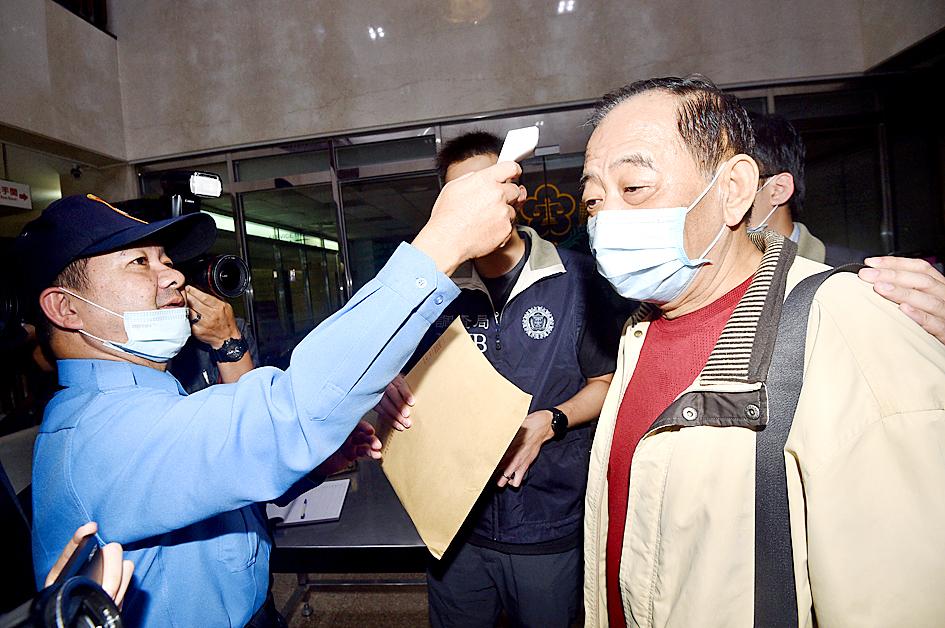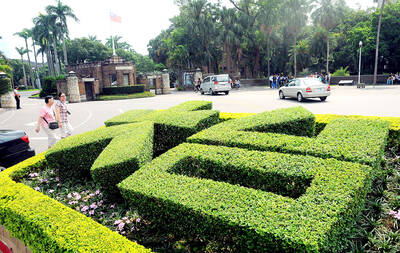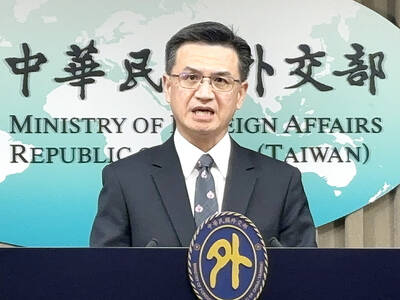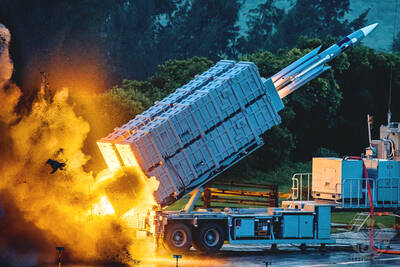The Taipei District Prosecutors’ Office yesterday indicted four retired Military Intelligence Bureau (MIB) officials, who are accused of providing China with a list of bureau personnel and other classified materials while attempting to recruit colleagues into a spy network in Taiwan.
Prosecutors charged Chang Chao-jan (張超然), Chou Tien-tzu (周天慈) and Wang Ta-wang (王大旺), former colonels at the bureau, and Yueh Chih-chung (岳志忠) — a former major general and chief of the MIB’s Fifth Bureau, where he was in charge of sending agents to China on covert assignments — with breaches of the National Security Act (國家安全法) and the National Intelligence Services Act (國家情報工作法).
In 1999 Chang was dispatched to China to locate a fellow MIB officer surnamed Lu (陸), who was arrested by Chinese authorities, prosecutors said, adding that Chang had befriended a Chinese security official surnamed Wei (韋), based in Guangzhou.

Photo: Peter Lo, Taipei Times
Chang was recruited to spy for China by Wei, who enticed Chang with money and travel, prosecutors said, adding that Wei instructed Chang to provide names of MIB personnel and their job functions.
Investigators said that Chou was later recruited, and he and Chang worked in tandem, passing on classified information and materials, as well introducing fellow officers to Wei when they were in China, sometimes on official assignments.
After their retirement, Chang and Chou made numerous trips to China starting in 2012, on the pretext that they were on personal or family vacations, and met with Wei and other Chinese intelligence officers, prosecutors said.
They later learned that Yueh had plans to visit his family in China, but Yueh was concerned that his MIB background might make it difficult for him to enter the country, prosecutors said, adding that Chang and Chou then persuaded Yueh to meet Wei in Macau.
The three flew to Macau in 2012, where they met with Wei, who worked with Yueh to identify more than 20 MIB agents from photographs, prosecutors said.
After being promised money, Yueh allegedly agreed to provide other classified information on the bureau’s operations, hierarchy and structure, they said, adding that Yueh was paid HK$6,000 (US$774) and received other gifts.
Chou allegedly accompanied Yueh to China in 2016 and 2018, when they met with Wei and other Chinese intelligence officers to provide additional classified information, prosecutors said, adding that Yueh allegedly later took trips to other Chinese cities with all expenses and accommodation paid for by Wei.
Chang in 2016 allegedly persuaded Wang to visit China, as Wang also had family there, prosecutors said.
Wang visited Guangzhou in August that year and had a meeting with Wei, during which Wang allegedly agreed to provide information on the bureau and other Taiwanese intelligence operations, in exchange for money and gifts, prosecutors said.
Investigators said that Chang and Chou were also active in Taiwan, working to recruit bureau and military officers to develop a spy network to access and obtain sensitive materials for the Chinese government in exchange for money.

Taiwan has experienced its most significant improvement in the QS World University Rankings by Subject, data provided on Sunday by international higher education analyst Quacquarelli Symonds (QS) showed. Compared with last year’s edition of the rankings, which measure academic excellence and influence, Taiwanese universities made great improvements in the H Index metric, which evaluates research productivity and its impact, with a notable 30 percent increase overall, QS said. Taiwanese universities also made notable progress in the Citations per Paper metric, which measures the impact of research, achieving a 13 percent increase. Taiwanese universities gained 10 percent in Academic Reputation, but declined 18 percent

Chinese President Xi Jinping (習近平) yesterday met with former president Ma Ying-jeou (馬英九) at the Great Hall of the People in Beijing, with Xi’s opening statement once more emphasizing that people on both sides of the Taiwan Strait are Chinese and that foreign intervention cannot change their inevitable unification. Xi said that 5,000 years of history of zhonghua minzu (中華民族, ethnic Chinese group) have seen their ancestors move to Taiwan to establish new lives, while also documenting them fighting side-by-side against foreign forces and finally freeing Taiwan. “Both sides are Chinese,” and there are no issues that cannot be worked through, he

BULLY TACTICS: Beijing has continued its incursions into Taiwan’s airspace even as Xi Jinping talked about Taiwan being part of the Chinese family and nation China should stop its coercion of Taiwan and respect mainstream public opinion in Taiwan about sovereignty if its expression of goodwill is genuine, the Ministry of Foreign Affairs (MOFA) said yesterday. Ministry spokesman Jeff Liu (劉永健) made the comment in response to media queries about a meeting between former president Ma Ying-jeou (馬英九) and Chinese President Xi Jinping (習近平) the previous day. Ma voiced support for the so-called “1992 consensus,” while Xi said that although the two sides of the Taiwan Strait have “different systems,” this does not change the fact that they are “part of the same country,” and that “external

UNDER DISCUSSION: The combatant command would integrate fast attack boat and anti-ship missile groups to defend waters closest to the coastline, a source said The military could establish a new combatant command as early as 2026, which would be tasked with defending Taiwan’s territorial waters 24 nautical miles (44.4km) from the nation’s coastline, a source familiar with the matter said yesterday. The new command, which would fall under the Naval Command Headquarters, would be led by a vice admiral and integrate existing fast attack boat and anti-ship missile groups, along with the Naval Maritime Surveillance and Reconnaissance Command, said the source, who asked to remain anonymous. It could be launched by 2026, but details are being discussed and no final timetable has been announced, the source